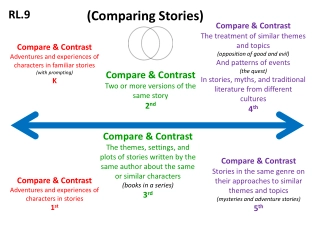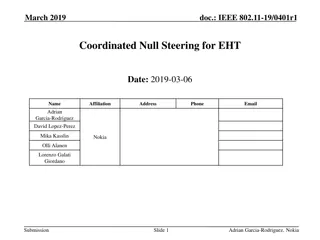Herding Nulls and Other C# Stories From the Future
Explore the challenges of dealing with nulls in C#, including expression of intent, enforcement mechanisms, and solutions to ensure null safety within the existing language. Learn how to differentiate between nullable and non-nullable types, protect non-null types from nulls, and strike a balance between completeness and convenience in null handling.
Uploaded on Sep 22, 2024 | 1 Views
Download Presentation

Please find below an Image/Link to download the presentation.
The content on the website is provided AS IS for your information and personal use only. It may not be sold, licensed, or shared on other websites without obtaining consent from the author.If you encounter any issues during the download, it is possible that the publisher has removed the file from their server.
You are allowed to download the files provided on this website for personal or commercial use, subject to the condition that they are used lawfully. All files are the property of their respective owners.
The content on the website is provided AS IS for your information and personal use only. It may not be sold, licensed, or shared on other websites without obtaining consent from the author.
E N D
Presentation Transcript
Herding Nulls and other C# stories from the future Mads Torgersen, C# Lead Designer .NET Conf
Stack Overflow - most popular technologies stackoverflow.com/insights/survey/2017#most-popular-technologies
Stack Overflow - most loved technologies stackoverflow.com/insights/survey/2017#most-loved-dreaded-and-wanted
Herding nulls the problem Every reference type allows null! Code must be defensive about it C# shares this with most object oriented languages Not all languages have this problem Differentiate between nullable and non-nullable Use pattern matching or similar to conditionally unpack nullables Components of a solution Expression of intent (nullable or not?) Enforcement of intent (regulate assignment and dereference) Within an existing language! There are billions of lines of C# code, many of them well-tested against null
Herding nulls expression of intent public class Person { public string FirstName { get; set; } public string MiddleName { get; set; } public string LastName { get; set; } }
Herding nulls expression of intent public class Person { public string! FirstName { get; set; } public string? MiddleName { get; set; } public string! LastName { get; set; } }
Herding nulls expression of intent public class Person { public string FirstName { get; set; } public string? MiddleName { get; set; } public string LastName { get; set; } }
Herding nulls enforcement Protect non-null types from nulls Protect nulls from dereference Must be optional Turn it on when you re ready to know Can t affect semantics - warnings, not errors Must do a good job with existing code Can t force you to rewrite good code Recognize existing ways of ensuring null safety (checks and assignments) Can t be exhaustive Tradeoff between completeness and convenience
Extension everything new members extension Student extends Person { // static field static Dictionary<Person, Professor> enrollees = new Dictionary<Person, Professor>(); // instance method public void Enroll(Professor supervisor) { enrollees[this] = supervisor; } // instance property public Professor? Supervisor => enrollees.TryGetValue(this, out var supervisor) ? supervisor : null; // static property public static ICollection<Person> Students => enrollees.Keys; // instance constructor public Person(string name, Professor supervisor) : this(name) { this.Enroll(supervisor); } }
Extension everything new members extension Student extends Person { static Dictionary<Person, Professor> enrollees = new Dictionary<Person, Professor>(); public void Enroll(Professor supervisor) { enrollees[this] = supervisor; } public Professor? Supervisor => enrollees.TryGetValue(this, out var supervisor) ? supervisor : null; public static ICollection<Person> Students => enrollees.Keys; public Person(string name, Professor supervisor) : this(name) { this.Enroll(supervisor); } } Person mads = new Person("Mads Torgersen", tonyHoare); WriteLine(mads.Supervisor); var tonysStudents = from s in Person.Students where s.Supervisor == tonyHoare select s.Name;
Extension everything interfaces extension Student extends Person { static Dictionary<Person, Professor> enrollees = new Dictionary<Person, Professor>(); public void Enroll(Professor supervisor) { enrollees[this] = supervisor; } public Professor? Supervisor => enrollees.TryGetValue(this, out var supervisor) ? supervisor : null; public static ICollection<Person> Students => enrollees.Keys; public Person(string name, Professor supervisor) : this(name) { this.Enroll(supervisor); } } class Professor { } interface IStudent { string Name { get; } Professor? Supervisor { get; } void Enroll(Professor supervisor); }
Extension everything interfaces extension Student extends Person : IStudent { static Dictionary<Person, Professor> enrollees = new Dictionary<Person, Professor>(); public void Enroll(Professor supervisor) { enrollees[this] = supervisor; } public Professor? Supervisor => enrollees.TryGetValue(this, out var supervisor) ? supervisor : null; public static ICollection<Person> Students => enrollees.Keys; public Person(string name, Professor supervisor) : this(name) { this.Enroll(supervisor); } } class Professor { } interface IStudent { string Name { get; } Professor? Supervisor { get; } void Enroll(Professor supervisor); }
Extension everything interfaces as type classes interface IGroup<T> { static T Zero { get; } static T operator +(T t1, T t2); } extension IntGroup extends int : IGroup<int> { public static int T Zero => 0; } public static T AddAll<T>(T[] ts) where T : IGroup<T> { T result = T.Zero; foreach (T t in ts) { result += t; } return result; } int sixtyThree = AddAll(new [] { 1, 2, 4, 8, 16, 32 });
Records class Person(string First, string Last); class Person : IEquatable<Person> { public string First { get; } public string Last { get; } public Person(string First, string Last) => (this.First, this.Last) = (First, Last); public void Deconstruct(out string First, out string Last) => (First, Last) = (this.First, this.Last); public bool Equals(Person other) => other != null && First == other.First && Last == other.Last; public override bool Equals(object obj) => obj is Person other ? Equals(other) : false; public override int GetHashCode() => GreatHashFunction(First, Last); }
Resources github.com/dotnet/csharplang blogs.msdn.microsoft.com/dotnet























